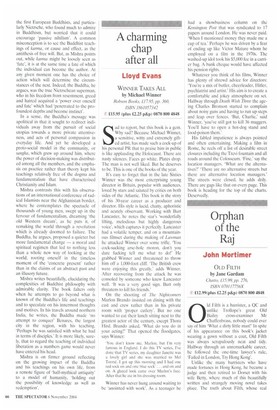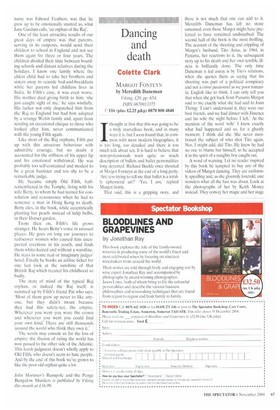Orphan of the Raj
John Mortimer
OLD FILTH by Jane Gardam Chatty, £15.99, pp. 276, ISBN 070117756X (6£12.99(plus 12.25 p&p) 0870 800 4848 0 Id Filth is a barrister, a QC and unlike Trollope's great Old Bailey cross-examiner Mr Chaffenbrass, nobody could ever say of him 'What a dirty little man!' In spite of his appearance on this book's jacket wearing a gown without a coat, Old Filth was always scrupulously neat and tidy. Halfway through an unremarkable career, he followed the one-time lawyer's rule, 'Failed in London, Try Hong Kong'.
Unlike the many barristers who have made fortunes in Hong Kong, he became a judge and then retired to Dorset with his wife Betty, where much of this beautifully written and strangely moving novel takes place. The truth about Filth, whose real name was Edward Feathers, was that he grew up to be emotionally stunted as, what Jane Gardam calls, 'an orphan of the Raj'.
One of the least attractive results of our great days of empire was that parents, serving in its outposts, would send their children to school in England and not see them again for three or four years. The children divided their time between boarding schools and distant relatives during the holidays. I know one family where the eldest child had to take her brothers and sisters away to seaside bed-and-breakfasts while her parents led childless lives in India. In Filth's case, it was even worse. his mother died giving birth to him; 'she just caught sight of me,' he says wistfully. His father not only dispatched him from the Raj to England but had him adopted by a strange Welsh family and, apart from sending an occasional cheque to those who looked after him, never communicated with the young Filth again.
Like most of the Raj orphans, Filth put up with this atrocious behaviour with admirable courage, but no doubt it accounted for the stiffness of his upper lip and his emotional withdrawal. He was probably too self-contained and modest to be a great barrister and too shy to be a remarkable judge.
He became simply Old Filth, halfremembered in the Temple, living with his wife Betty, to whom he had turned for consolation and reassurance when he had to sentence a man in Hong Kong to death. Betty dies, in the book, while eccentrically planting her pearls instead of tulip bulbs, in their Dorset garden.
From then on, Filth's life grows stranger. He hears Betty's voice in unusual places. He goes on long car journeys to rediscover women who caused him unexpected erections in his youth, and finds them white-haired and without a waistline. He stays in some real or imaginary judges' hotel, Finally he books an airline ticket for one last look at the sunshine of that British Raj which treated his childhood so badly.
The state of mind of the typical Raj orphan, or indeed the Raj itself, is summed up by Filth's friend Pat who says, Most of them grew up never to like anyone, but they didn't moan because they had this safety-net, the empire. Wherever you went you wore the crown and wherever you went you could find your own kind. There are still thousands around the world who think they own it,' The words may console us for the loss of empire; the illusion of ruling the world has now passed to the other side of the Atlantic. This harsh judgment doesn't wholly apply to Old Filth, who doesn't stem to hate people. And by the end of this book we've grown to like the poor old orphan quite a lot.
John Mortimer's Rumpole and the Penge Bungalow Murders is published by Viking this month at £1699.



























































































































 Previous page
Previous page